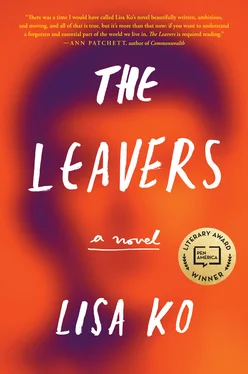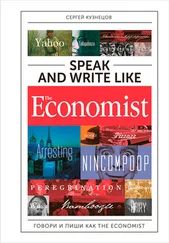It wasn’t hard, talking to you. I told you how I had come to New York. You told me about Ridgeborough, the town where you had gone after the Bronx, and your American parents, whom you called Peter and Kay. I didn’t want to know their names. It should have been me who had gone to your high school graduation, who called you on your birthday, whose house you returned to at Christmas. I should have been the one to take credit for raising you. But all you could remember was me leaving and not finding you again.
You were angry. I couldn’t blame you. I was angry, too. I wanted to find a way to fix it, but didn’t know how, not without telling you about Ardsleyville. I didn’t want to think about Ardsleyville. Instead, I said all the wrong things.
Leon was the only person I had ever told, and though enough time had passed that it probably didn’t matter — no one would fine me now or give me prison time for how I left America — it wasn’t information I wanted to share. Telling Yong would ruin everything. There were still nights I would wake up thinking of the concrete floor, the Styrofoam bowls of lukewarm oatmeal — I couldn’t look at oatmeal now; I’d never eat it again — and the din of hundreds of women talking in different languages. I hated that Leon knew this, how fully I’d exposed myself to him. Because if he knew, then it had been real, not a nightmare I could just write off as my imagination. Like how talking to you reminded me of the nightmare of losing you.
Leon was the one who had left on purpose, not me. I didn’t leave on purpose. I loved you more than anyone. You could call another lady “Mama,” but I was your mama, not her. I knew I had forfeited the right to say that, but it was never going to change.
There was a knock on the window, and I jumped in my chair, saw Yong pointing at his watch. I told you I had to go.
THE FUZHOU BUSINESS LEADERS Forum awards dinner was in a conference hall with small windows near the ceiling. It was May, warm outside, but inside I was shivering as Yong fidgeted next to me. Onstage, a real estate tycoon was rambling about his childhood in a village north of Fuzhou, running ten minutes past the five-minute time limit. “I learned the lessons of hunger as a child during the famine years,” the tycoon said in an oddly cheerful lilt, “when my mother would feed us a thin paste of rice and water. Our stomachs growled, but we never complained.”
Chopsticks clinked against the insides of bowls. Metal spoons scraped against serving plates. Yi Ba had said his family had been so poor that he and his brother had shared a single grain of rice, and I felt annoyed listening to the tycoon claim the same. He was rumored to never eat leftovers or use a towel more than once, his servants whisking away his bath linens immediately after he used them, the excess food disappearing as if it had never existed. I wanted to duck into the bathroom and call you, share the absurdity.
Between speakers, I tried to pay attention to the conversations around me. Lujin and Zhao wanted to buy a small country home in the mountains, while Zailang said he’d prefer one by the sea. I said I preferred ocean to mountains. I told the couple next to me about our kitchen renovations, gave them the names of the workers Yong and I had used. “Good craftsmanship,” I said, comforted by my city accent, the confident way I talked. These were characteristics of Fuzhou’s Polly, not the Polly who had lived in New York and wore five-dollar jeans and used the same soap to wash her face and body, who let her son watch TV all day.
“Hong Kong will be our next vacation destination,” Yong told Ning and Zailang. “And after that, Singapore and Tokyo.”
“Tokyo?” Zailang said. “Have you booked the tickets yet?”
“I haven’t gotten around to it,” Yong said. “Work is so busy. But perhaps a winter trip to Hong Kong. It’s so easy to get there. What do you think, Polly?”
“Sure.” I took a second helping of broccoli, but could barely taste the food. “Wonderful.”
“Let me know when you go, and I’ll send you a list of my favorite restaurants,” Ning said.
“That sounds great. Tell me more about what it’s like there.” But as I watched Ning’s mouth move, I was unable to concentrate on the words. Tomorrow, I would call and let you know I hadn’t meant to end our call so abruptly.
Our table was full of our friends, Zhao and Lujin, Ning and Zailang, and Yong’s other colleagues and their wives. I looked around the room and saw the same table duplicated, over and over: fat men in dark suits, lipsticked women in tight dresses, plates and plates of food, empty beer bottles. I didn’t look out of place. My purple dress had been tailored to fit, and I wore a pair of diamond earrings and a matching ring, a gold bracelet with oval loops that resembled a chain. My hair had been dyed and highlighted. Earlier tonight, after I got off the phone with you and changed into my dress, Yong and I had admired our reflections in the bedroom mirror. “Look how we match,” I said. I couldn’t tell him about you or Ardsleyville, destroy the illusion we built for ourselves.
Another round of dishes arrived, and the Forum’s president, a man in a pinstripe suit, introduced Yong, who made his way to the stage. He tapped the microphone to make sure it was on, even though it had been working fine when the president had spoken.
“I come from humble beginnings,” he said, “like so many of you. I met many obstacles and challenges along the way, but overcame them through perseverance. And now, I am proud to lead Yongtex. We are truly the future of business, because we’re not only a factory, but we work for the social good. First, by providing job opportunities to the needy.” He looked down at his notes and up at the crowd. I silently pleaded for him to keep talking. “And — second, we promote trade. Third, we are spurring economic development in the region and elevating the status of Fuzhou business.”
His words petered out, but he finished strong. Our table clapped, followed by the rest of the room. “Thank you,” Yong said. When he returned to the table, I could see how relieved he was. I placed a hand on his knee. We needed each other. I belonged here.
“You did good,” I said.
AFTER THE DINNER, WE had coffee at Ning and Zailang’s apartment. The women sat along the end of an L-shaped sectional couch, the men at the long dining table. Ning and Zailang had blocked off part of the living room and constructed a new wall to create a bedroom for their son, Phillip.
Lujin and Zhao’s daughter was taking grade nine English, even though she was only in grade eight. “She was falling behind, so we decided to push the teacher to place her in a higher class,” Lujin said. “That’s what you have to do, force them to do better.”
“Children don’t function that way,” I said. “They also need encouragement.”
Ning smiled. “You have to encourage, but you also have to be firm. They need to learn on their own.”
“But what are we telling our children if we set them up for failure?” I saw Ning exchange a look with Lujin. “We could be harming them, affecting them later in life.”
“On those TV shows the parents are always giving their children empty praise,” Lujin said. “But real life is different.”
“I am talking about real life,” I said.
“Real-life children aren’t like the ones you see on television.”
“I’m not talking about television. What, I can’t have an opinion about raising children, too?”
Lujin raised her eyebrows. Ning stood up and pulled down the front of her dress. “Excuse me, I need to check on Phillip. It’s his bedtime and I bet he’s still up.”
The room felt airless. “The weather has been so warm lately,” I said to Lujin.
Читать дальше











